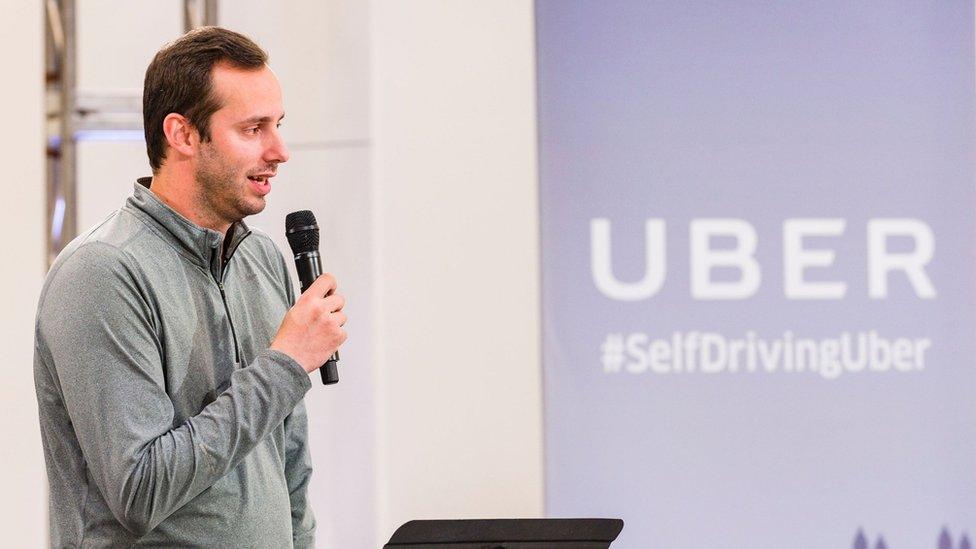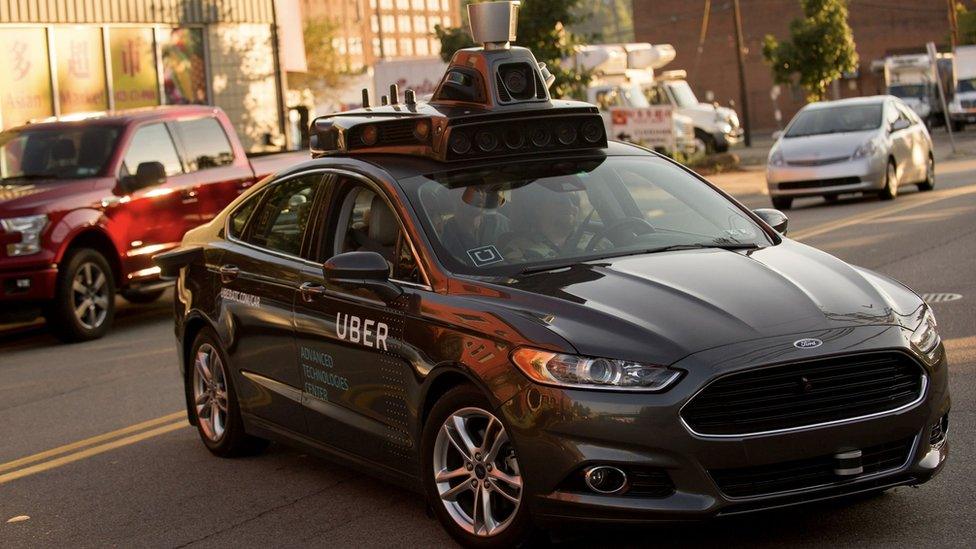Uber and Waymo face off in court over self-driving row
- Published

Anthony Levandowski is accused of downloading 14,000 files from his former employer
Two giants in self-driving car technology will face each other in court on Wednesday.
Ride-sharing firm Uber is accused of stealing trade secrets from Waymo - the company spun out from Google’s self-driving division.
Waymo has a requested an injunction that would stop Uber from using the disputed tech, which could severely hamper Uber’s development of self-driving cars.
Uber has denied the allegations.
Both sides will make their case to a judge in San Francisco on Wednesday morning in a bitter dispute that has become the talking point of Silicon Valley.
A judge will consider granting a preliminary injunction that would force Uber to immediately suspend use of the technology while legal proceedings were continuing.
In an increasingly angry battle, Waymo has accused Uber of being engaged in a “cover-up”.
Pleading the fifth
Waymo’s extraordinary lawsuit, filed in February, accused a former employee of downloading 14,000 documents relating to LiDAR, the system that allows self-driving cars to “see” what’s around them.
That employee, Anthony Levandowski, then went on to found Otto, a self-driving truck company later acquired by Uber for an estimated $680m, according to Bloomberg Businessweek, external.
Waymo said it was alerted to the possible infringement after being mistakenly copied into an email from one of Uber’s suppliers.

Uber said the cars on US roads used third-party LiDAR tech
After analysis of employee computers, Uber denied that the 14,000 files - more than nine gigabytes of data - ever made their way to Uber’s servers.
However, the company was not able to search the personal devices of Mr Levandowski, who has invoked his Fifth Amendment rights - a constitutional clause that allows US citizens to resist any request to share information that could put them at risk of self-incrimination.
This turn of events was given short shrift by the judge, who said Uber should threaten to fire Mr Levandowski if he did not comply.
"If you cannot find them in your files, there is going to be a preliminary injunction,” Judge William Alsup warned Uber.
"You're not denying it, no one is denying he has the 14,000 files. You keep on your payroll someone who took 14,000 documents and is liable to use them.”
He added: "This is an extraordinary case. I have never seen a record this strong in 42 years. So you are up against it.”
‘Misfire'
Uber has described Waymo’s lawsuit as a “misfire”. So far, it has defended itself by insisting that the apparently stolen documents are irrelevant, as none of Waymo’s technology has made its way into Uber’s work.
It said it had been working on LiDAR technology that had little bearing on Waymo’s efforts, and that the lawsuit was a way of stifling “independent innovation”.
Besides, the company has said, the self-driving cars it is trialling on US roads at the moment use third-party LiDAR hardware - not technology produced by either Uber or Waymo.
“If Waymo genuinely thought that Uber was using its secrets, it would not have waited more than five months to seek an injunction,” Uber said.
"Waymo doesn't meet the high bar for an injunction, which would stifle our independent innovation - probably Waymo's goal in the first place.”
Uber’s denial has led to Waymo being more aggressive. It accused Uber of hiding a prototype LiDAR device - essentially covering up that it had made use, if only at an early stage, of the trade secrets at the centre of this case.
In a counter-move intended to appease the judge, Uber last week removed Mr Levandowski from his post leading the self-driving programme and into a less senior role that does not involve working on LiDAR development.
At stake in court is both companies’ progress in developing technology which court documents described as being potentially as significant as the invention of the automobile itself.
________
Follow Dave Lee on Twitter @DaveLeeBBC, external
You can reach Dave securely through encrypted messaging app Signal on: +1 (628) 400-7370